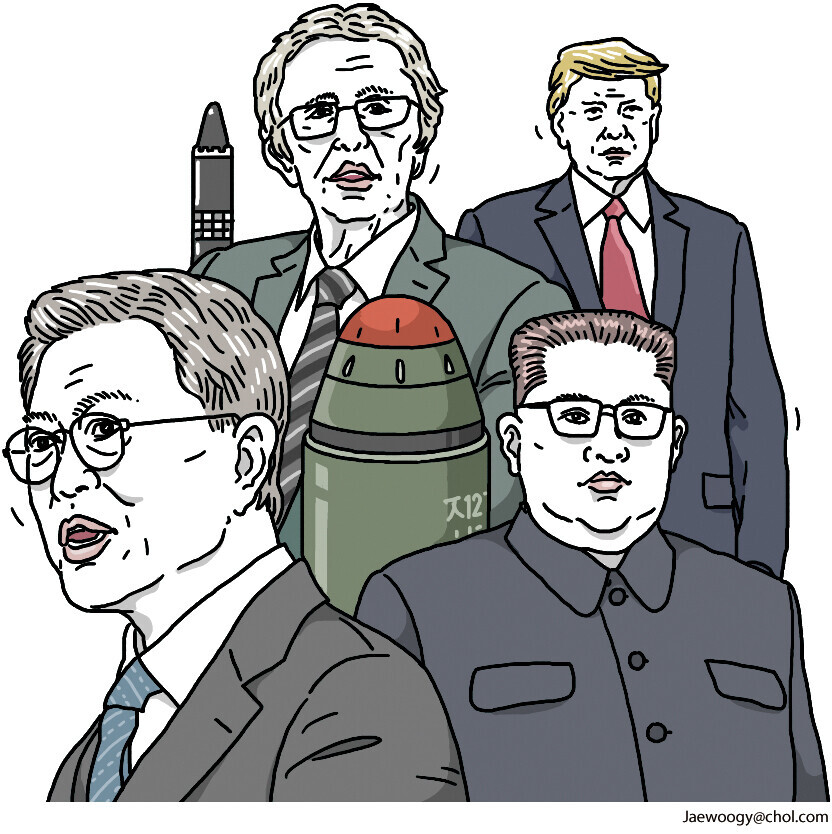hankyoreh
Links to other country sites 다른 나라 사이트 링크
[Column] The monumental shift in N. Korea’s nuclear program that never happened

What exactly did North Korea’s Nuclear Weapons Institute signify?
Former President Moon Jae-in’s recently released memoir covering his diplomatic and national security policies, “From the Frontier to the Center,” has triggered a rush of criticism from conservative media.
In opinion pieces published on May 20, both the Chosun Ilbo and Joongang Ilbo harshly criticized Moon, with each outlet respectively claiming that, when he was former president, he believed more in Kim Jong-un’s words than in factual truths, and that he blamed an ally for the failure to denuclearize North Korea.
The heart of their criticism seems to lie in the fact that they could not believe that a former president of South Korea could blame the failure of the North Korea-US summit on the US, which is a South Korean ally.
While the media should, naturally, be critical when reading a memoir of a former president, we should mull over Moon’s reasoning before blindly condemning him.
Moon believes that the main reason behind the breakdown of the February 2019 North Korea-US summit in Hanoi was “the US’ failure to understand the implications of the irreversible closure of the Yongbyon nuclear complex and the complete closure of the Nuclear Weapons Institute,” as written in on Page 290 of the memoir. It is worth noting that Moon was not the first to champion that argument. As Moon also states, that argument was made first by the only US nuclear scientist who visited the Yongbyon nuclear complex several times: Dr. Siegfried Hecker, a former senior fellow at the Center for International Security and Cooperation at Stanford.
On Sept. 6, 2018, a few months before the Hanoi summit, North Korean leader Kim Jong-un sent then-President Donald Trump a letter stating the following: “In addition to the steps we have taken up front, we are willing to take further meaningful steps one at a time in a phased manner, such as the complete shutdown of the Nuclear Weapons Institute or the Satellite Launch District and the irreversible closure of the nuclear materials production facility.”
In “Hinge Points: An Inside Look at North Korea’s Nuclear Program,” a book Hecker published in January 2023, after Kim’s letter was made public, Hecker makes an interesting statement. Hecker claims that the Nuclear Weapons Institute, which Kim said could be completely shut down, was the “brain center of the North’s nuclear program,” that “the complete shutdown of the NWI had never come up before” and that it was a “remarkable offer.”
Since “it is not possible to deploy nuclear weapons without the scientists and engineers from the labs,” the shutting down of the NWI meant “the eventual end of the nuclear weapons program.”
Would the US have known about this deeper meaning? In February 2022, after asking former US national security adviser John Bolton about the letter Kim sent, Hecker concluded that Bolton did not know what the institute was, “nor did he care to ask and find out.”
If the US had thoroughly inspected the meaning behind North Korea’s offer, history could have been made. Don’t you feel like thumping your chest in frustration?
By Gil Yun-hyung, editorial writer
Please direct questions or comments to [english@hani.co.kr]

Editorial・opinion
![[Editorial] It’s time for us all to rethink our approach to North Korea [Editorial] It’s time for us all to rethink our approach to North Korea](https://flexible.img.hani.co.kr/flexible/normal/500/300/imgdb/original/2024/0621/7517189559819182.jpg) [Editorial] It’s time for us all to rethink our approach to North Korea
[Editorial] It’s time for us all to rethink our approach to North Korea![[Column] Why empty gestures matter more than ever [Column] Why empty gestures matter more than ever](https://flexible.img.hani.co.kr/flexible/normal/500/300/imgdb/original/2024/0619/7217187833478369.jpg) [Column] Why empty gestures matter more than ever
[Column] Why empty gestures matter more than ever- [Editorial] Seoul’s part in N. Korea, Russia upgrading ties to a ‘strategic partnership’
- [Column] The tragedy of Korea’s perpetually self-sabotaging diplomacy with Japan
- [Column] Moon Jae-in’s defense doublethink
- [Column] S. Korea-China cooperation still has a long way to go
- [Editorial] Seoul must use tact and diplomacy to check deepening Russia-NK ties
- [Editorial] Thorough audit, evaluation of oil test drilling are needed
- [Editorial] Yoon prioritizes his administration over South Korea’s safety once again
- [Column] The monumental shift in N. Korea’s nuclear program that never happened
Most viewed articles
- 1[Editorial] It’s time for us all to rethink our approach to North Korea
- 2North Korea’s real motive for publishing the full text of new treaty with Russia
- 3[News analysis] N. Korea’s new pact with Russia is ‘mirror image’ of Yoon’s alliance with US
- 4Seoul hints at lethal weapons aid to Ukraine to put pressure on Russia
- 5Seoul decries N. Korea-Russia mutual defense pact as ‘absurd’
- 6Hot weather hat trick to send the mercury soaring in Korea
- 7[Editorial] Seoul’s part in N. Korea, Russia upgrading ties to a ‘strategic partnership’
- 8[Editorial] Fortified N. Korea-Russia ties should be a wakeup call for Seoul
- 9Putin, Kim pledge ‘mutual assistance’ in event of outside aggression
- 10[Photo] K-pop: For everyone, everywhere